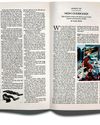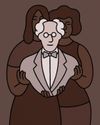RAT PACK

Ra Oats can't vomit. This may be a function of their anatomy-their stomachs are "not well structured for moving contents towards the esophagus" is how one study delicately put it--or it may have something to do with their brain circuitry, or it may be a combination of the two. Whatever the cause, the result is that rats, contrary to their popular (or unpopular) image, are fussy eaters. Even as they pick through the trash, they're hesitant to try new foods. This makes poisoning them complicated; quite often and quite literally-they won't take the bait.
In 1942, a Johns Hopkins biologist named Curt Richter discovered a new poison that rats apparently couldn't taste.
His breakthrough caught the attention of the United States Office of Scientific Research and Development, the Second World War equivalent of DARPA. The agency, among its many worries, feared that the Axis powers were at work on biological weapons that would use rats as vectors. (In fact, the Japanese did try to spread plague during the war, with some success.) The O.S.R.D. had the poison-alpha-naphthyl thiourea, or ANTU for short-tested in the back alleys of Baltimore. The city was so pleased with the resulting carnage that it appointed Richter to lead a new rodentcontrol office, based in City Hall. By 1946, ANTU-laced corn had been spread over more than fifty-five hundred blocks and, according to Richter, "well over a million rats" had been killed.
By that point, however, ANTU was starting to lose its efficacy. Apparently, rats were learning to associate adulterated corn with unpleasant consequences and becoming bait-shy. New measures, it was realized, would be needed, and an even more ambitious research effort was born-the Rodent Ecology Project.
Diese Geschichte stammt aus der October 07, 2024-Ausgabe von The New Yorker.
Starten Sie Ihre 7-tägige kostenlose Testversion von Magzter GOLD, um auf Tausende kuratierte Premium-Storys sowie über 9.500 Zeitschriften und Zeitungen zuzugreifen.
Bereits Abonnent ? Anmelden
Diese Geschichte stammt aus der October 07, 2024-Ausgabe von The New Yorker.
Starten Sie Ihre 7-tägige kostenlose Testversion von Magzter GOLD, um auf Tausende kuratierte Premium-Storys sowie über 9.500 Zeitschriften und Zeitungen zuzugreifen.
Bereits Abonnent? Anmelden

MOVE FAST AND BREAK THINGS
What did Elon Musk accomplish at the Department of Government Efficiency?

ANY HUMAN HEART
Rossi's Auto Repair and Full Service Gas had been there for as long as Maureen had been a resident of this New Jersey town.

Molly Fischer on Mark Singer's “Mom Overboard!”
There are plenty of old magazine stories I love, but I also love old magazines themselves.

TRUMP'S TO-UNDO LIST
Abolish amendments. Makes Constitution look weak. I read Constitution. I read passages, I read areas, chapters. Nobody reads Constitution more than me! Nobody even knows what the Fourteenth means. Let's go back to first draft!

HELP WANTED
The history of advice columns.

SOLO FLIGHTS
Jean Smart in “Call Me Izzy” and John Krasinski in ‘Angry Alan.”

EARLY WARNINGS
New technologies promise to catch more cancers sooner. But such screening can pose hidden hazards.

HEADPHONES ON
How Addison Rae went from TikTok to the pop charts.

SPECIAL PEOPLE
What we talk about when we talk about genius.

TARIFF MEN
President Trump’s McKinley fixation and the demise of liberal internationalism.
